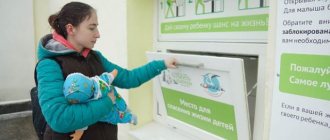Where should a child be registered after a divorce?
As a rule, by the time of the trial, the separating parents have already agreed where and with whom the child will live, but if the degree of tension in the relationship does not allow dialogue, then the court will resolve this issue (Clause 2 of Article 24 of the RF IC).
Although most often children remain to live with their mother, it happens that the father becomes the main parent.
Ideally, after the parents’ divorce, a child should receive registration at the place of his residence with one of the former couple. Read more about how a newborn child is registered in an apartment after birth, and you can find out how to register a child at the place of residence of one of the parents here.
If the parent who does not intend to live with the child has the right of ownership of housing, then the court may oblige him to provide members of his former family with a new home, and with conditions no worse than the current ones.
What is clear is that it is impossible to discharge the offspring “to nowhere . If relatives - grandparents, sisters and brothers, uncles and aunts - have extra square meters of living space, it is also possible to resolve the issue of registering a child and his mother (or father).
Children under the age of 14 cannot be registered in the living space of relatives without a father or mother , only together with the parent for whom this is actually determined by the court or a common decision of the couple. It is impossible to register a child without a mother even with relatives.
The legislation of the Russian Federation protects the rights and interests of children, so deregistration from the previous place of residence on the initiative of the parent - the owner of the property - will not work, no matter how much he would like it. You can view detailed instructions for registering and discharging minor children from an apartment here.
Registration of a child takes priority over the wishes of the residents of the apartment where one of the parents lives and is registered. This means that even if the homeowner does not want this, he does not have the opportunity to slow down the child’s registration with his parent. Is it possible to register a child without the owner’s consent to an apartment and how to register a newborn, read here.
The result of a peaceful decision on the child’s place of registration is a joint statement , which indicates where and with whom the child will live.
Although the law on this issue (clause 2 of Article 65 of the RF IC) does not require special paper, in practice, this statement often also stipulates the mode of communication between the other parent and the offspring living separately.
There is no need for this document, drawn up in a free style, to be certified by a notary , but if it also specifies the procedure for providing alimony, then after notarization the paper acquires the force of a writ of execution.
You can find out more about where to register a child after birth and where to go here.
How to discharge a child from his father’s apartment and register him with his mother: procedure for minors
Where should a child be registered after a divorce? Based on the requirements of family law, after divorce, a son or daughter must have permanent residence with one of the parents. In practice, this issue is resolved in the following way:
- in the vast majority of cases, the minor remains with the mother. If she owns housing (entirely or a share in the right), her registration will be there. If she is registered in a residential area that does not belong to her, her son or daughter is registered there;
- if the mother does not have housing or living conditions do not allow the minor to be registered there, he is registered with the father. This rule does not apply to cases where the mother lives in the premises on the basis of social rent: the child still receives the right to live with her, and the position of other family members will not be taken into account - the rights of the minor are more important;
- if the living conditions of the child’s close relatives (grandfathers, grandmothers, older sisters, etc.) allow, he and his mother can be registered there. Moreover, up to the age of 14, registration is required only for a mother and son (or daughter) together - a child cannot be registered alone.
Let's look at a specific situation: there is an apartment that belonged to the father before marriage. While he and his mother were married, both the mother and the minor son were registered there. However, a divorce took place, and the mother, who did not have rights to this housing, was forced to leave the premises and move somewhere else. How to register a child in this case?
Here the court will take into account the following:
- Place and basis of permanent registration of the mother. If she owns another home and she is registered there, they will register her. If, as happens much more often, she lives in rented apartments or with relatives, most likely, the registration will not change and will remain the same, and the father will not be able to register his son, even if he lives most of the time with his mother;
- Age. After 14 years of age, the child can be registered separately. But before this age is reached, the minor must be registered only with his mother or father;
- Position of the guardianship authority. In legal disputes of this kind, a guardianship is involved, and its representatives are obliged to give their opinion on the claims of the plaintiff and the arguments of the defendant.
As a result, most likely, in such a situation, the son, even if he lives with his mother, will remain registered in his father’s apartment.
Rights of the parties
When implementing the procedure, you need to contact several government agencies:
- guardianship and trusteeship authorities;
- passport office for making changes to documents;
- to the Federal Migration Service for further registration of the child at a new place of residence.
If the interests of the child are affected or his rights are violated, the process is sent for consideration to a district or city court. The Magistrate's Court does not have the right to consider such cases.
In cases where a minor does not have ownership rights, re-registration does not take much time.
Start of the procedure
There are a few things you need to know here:
- in the absence of ownership rights - without the consent of the board of trustees;
- if available, consent of the board of trustees;
- through the court if difficulties arise with re-registration.
If this is the first case, then the algorithm of actions is as follows:
- the plaintiff visits the passport office with an application of the established form and a complete package of documents;
- consideration of the application takes no more than three working days, after which a decision on the case is made;
- For the fastest possible decision, you should contact the passport office for further re-registration of the child at the new place of residence.
If the child is a co-owner of the property, then the algorithm is as follows:
- the plaintiff applies to the guardianship and trusteeship authorities to obtain permission. To do this, he submits an application of the established form and a fairly substantial package of documents;
- after receiving permission, you can proceed to the next stage, where the acquisition of real estate or the preparation of documents confirming ownership of the object is carried out;
- Then the baby’s father is discharged from the territory. To do this, you need to contact the passport office with an application and a complete package of documents;
- registering the baby at a new address. To do this, a person applies to the passport office at the place of new residence.
Appeal through the court occurs if a minor loses the right to use, as well as if it was not acquired.
With whom and where the children will live after a divorce is determined by mutual agreement of the parents, or by a court decision, based on the interests of minors (Article 65 of the RF IC).
When registering and discharging a child, it is important to take into account a number of circumstances, such as the age of the person, and whether the housing is privatized or not. The rights and legitimate interests of children should not be infringed.
To carry out deregistration or registration of children during the divorce of parents, it is necessary to follow a certain procedure prescribed by law, attach a list of necessary documents, and fulfill the legal requirements for registering or deregistering a child at his place of residence.
Discharging a child from an apartment is a complex procedure. If spouses decide to file for divorce, it is important to know that divorce should not affect the rights of children (Article 55 of the RF IC).
If a citizen wishes to expel his child from one residential premises for registration in another, it is important to consider:
- Whether or not a minor is the owner of privatized housing. The participation of children in the privatization of residential premises in which they live is mandatory (Federal Law No. 1541-1 of July 4, 1991).
- Is the child registered in social housing (housing that by right of ownership belongs to the state or local authorities).
We suggest you read: What is the statute of limitations for transport tax?
To discharge children from privatized or municipal housing, the following conditions must be met:
- obtain written permission from the guardianship and trusteeship authorities;
- After discharge, it is necessary to register the child in a different living space together with the parent in the near future, if the minor is under 14 years old.
There are often situations when the parent with whom the minor no longer lives, but where he is still registered, wants to discharge a child after a divorce.
Example
Popov I.E. filed a lawsuit against his ex-wife G.N. Popova. in order to discharge their common seven-year-old son, A.I. Popov, from their apartment. The plaintiff indicated that after he and Popova G.N.
divorced, the son began to live with his mother at a new address and has been living with his mother for about five years, but is still registered in his apartment. Defendant - Popova G.N.
The mother believes that since her son is only seven years old, he is not yet able to use his housing rights; when the son turns fourteen, he himself will be able to choose his place of residence. A representative of the guardianship authorities was present at the court hearing and agreed with the mother’s arguments.
The court came to the conclusion that the claim should be rejected because the child was registered in the father’s apartment by mutual agreement between the spouses, he equally has the right to live in both the father’s and mother’s living quarters, but being a minor, the son cannot take advantage of their housing rights in full.
You should know that you cannot register a child with his father when, according to a court decision, he must be and live with his mother or vice versa.
Registration of children means registration of minors at their place of residence. The place of residence of a child under 14 years of age is the place of residence of his parents, legal representatives, guardians or trustees (Article 20 of the Civil Code of the Russian Federation).
After fourteen years of age, a person may have a registration at the place of residence that does not coincide with the registration of his parents.
Determining a new place of registration of a child has important legal significance, as it determines:
- enrollment of children in preschool and school institutions;
- receiving various government benefits;
- a child’s visit to a children’s clinic, etc.
To register children at a new place of residence in the event of a divorce, the consent of one of them to the registration of a minor or a court decision indicating with whom the child should live is required.
To register a child in a privatized apartment in which his parent is registered, it is necessary to take into account that:
- the consent of the owner and persons registered in this housing is not required;
- the parent himself must have ownership rights to such residential premises;
- upon registration, you can decide on a specific share in privatized housing;
- Lack of square meters cannot be a reason for refusal of registration.
Residential premises in which children can be registered include: a room, an apartment and its part, a residential building and its part (Article 16 of the Housing Code of the Russian Federation). You cannot register a child in a garden house or a house that is recognized as unsafe.
Example
The mother of a fifteen-year-old son, after divorcing her husband, decided to register him with his grandfather - her father, who was registered in an old five-story apartment building.
The mother wanted her son to live near the college where he planned to enroll soon. When the mother applied to the migration authority for registration, it turned out that the house where the grandfather lived was in disrepair and was subject to demolition.
Therefore, you cannot register there for permanent residence.
The rights of children registered in privatized apartments are no different and are equal to the rights of other persons who live in this residential premises.
Non-privatized residential premises may be owned by state or municipal authorities. Such housing belongs to a person or persons exclusively under the right of social tenancy (that is, residents do not have the right to sell, exchange, gift or inherit it).
To register children in social residential premises, the following is not required:
- written consent of the remaining family members who live in this residential premises:
- permission for registration from state and municipal authorities (Article 70 of the Housing Code of the Russian Federation).
The court will decide
For those representatives of families who gave birth to a child, but were unable to choose the most acceptable option for residence and registration for the baby, the RF IC has paragraph 3 of Article 65, according to which the court will, of its own free will, determine this place .
In this case, the interests of the minor are placed at the forefront, and the opinion of the offspring himself matters, if he is already 10 years old.
One of the four who is categorically determined, for the benefit of the child, to register him with himself, must draw up and submit a statement of claim to the district court , in which he states the following:
- it is possible to create good living and study conditions for a son or daughter, since there is a comfortable apartment with sufficient space;
- Having a permanent job with a decent salary allows you to provide a comfortable existence for your child;
- the other parent does not have his own home and cannot provide the child with the proper level of well-being.
Next, when formulating a request to the court, you should ask for the possibility of the child living and registering at this address, and withhold alimony from the defendant.
Since the trial is taking place with the participation of representatives of the PLO , the best option for further residence and registration of the baby will be chosen.
In order to win back the child, but not for the sake of a desire to annoy the ex-spouse, but precisely for the good of the child, it is important to correctly state the motivation when drawing up an application , so it is better to entrust this important matter to a lawyer, a specialist in cases of this kind.
Do I have the right to live in an apartment where the child is registered?
Then they get divorced, you never know - they don’t get along in character, and then, a few years later, the uncle’s son marries some aunt who is greedy for someone else’s property, which never belonged to her, and she begins to make some kind of Barbarossa plans regarding this property.
I want to come there and prevent her from living her life for her own pleasure. There have been many attempts to come to an agreement, but there is no longer any strength. By the way, with the real price of the apartment being about 3 million, she wants 1.4. My husband and father-in-law also promise to come there, but it will be hard for them after work, and I have free time.
Why is it necessary to register a child?
Registration is necessary to ensure the normal functioning of the child , because without a certificate of registration it is impossible to:
- receive free medical care;
- enroll the child in a preschool or school;
- draw up paperwork to receive maternity capital;
- receive benefits, benefits, etc.
An appeal for any of the above reasons requires the provision of a certificate of registration of the cub.
Read more about whether a minor child needs registration and how to register him before the age of 14 and after, in a separate article.
Does one of the parents have the right to live where the minor lives?
It is where the parent lives that the child must legally live - this is what Article 20 of the Civil Code of the Russian Federation says.
If it turns out that the offspring has a residence permit, then whether one of the parents can live in this area is an ambiguous question. For example, does the ex-wife have the right to live at the place of registration of the child after a divorce?
A child has the right to be moved in with his mother or father without the permission of anyone, be it the owner of the home, but not vice versa. You can find out more about whether you need permission from the mother or father or the owner to register a child here.
Does the father have the right to live at the place of registration of the child (or mother)? In order to live where a minor under the age of 14 is located, his mother (or father) must acquire the right to use housing, depending on his status :
- if housing is used under a social tenancy agreement, then it is necessary to obtain the consent of all residents of this living space (Article 70 of the Housing Code of the Russian Federation);
- if the home is in privatized status, you need to try to get approval from all owners (Article 30 of the Housing Code of the Russian Federation, Part 1 of Article 246 of the Civil Code of the Russian Federation).
Can the mother live with the child's registration? If an attempt to reach an agreement with the owners or tenants is unsuccessful, the mother will not be able to exercise her right to live where the baby is registered .
Do I have the right to live in an apartment where the child is registered?
My 14-year-old son and I own a 2-room apartment in shared ownership (2/3 and 1/3), we are registered, as well as our husband and 5-year-old daughter. My whole family is leaving for permanent residence in Canada, all the documents are ready, but the guardianship authorities do not want to give permission to sell the apartment without purchasing housing for a minor or offer to open an account.
I am the owner of a three-room apartment in which, besides me, two children and an ex-husband are registered. The court found that the ex-husband has the right of residence without ownership rights. Can I sell the apartment, leaving my ex-husband registered there, in order to buy a smaller one and register.
What rights does a child have regarding registration after a divorce?
After the breakdown of the marital relationship, the child has the full right to registration at his previous place of residence , if there are no other options. It will not be possible to discharge the offspring - the law does not approve of this.
And if the child is registered with the father, what are the rights of the mother? The owner of the living space has the right to discharge the ex-wife immediately after the court ruling enters into legal force, but he will not be able to deprive the child of registration.
Another thing is if the mother with whom the offspring remains has the opportunity to obtain registration in another place, then the child will automatically be registered with her .
It even happens that a minor child remains registered in his father’s apartment, but in fact his and his mother’s place of residence is located at a different address . This is not entirely correct; it is desirable that the actual address coincides with the place of registration.
Does the mother have the right to live in the apartment where the child is registered?
My friend got burned in front of her husband.
I won’t go into details, my husband immediately filed for divorce, the apartment is his, the child is registered there, the girlfriend is with her parents. The husband insists. so that a friend and her child would already move to their place of registration. The problem is that during her marriage, the friend’s mother acquired a common-law husband, who is not at all happy about the arrival of her friend, also with a child. His mother is on his side. The question is: does the girlfriend have the right to live in her husband’s apartment? Is the child registered there? I asked at work, many said that they had, but several people insisted on the new residential complex, according to which this is no longer provided for and the husband can write out the residential complex and the child as former family members. The author has NO rights if she herself is registered in another place and if the child does not need the mother to live with him, your friend, if she wants to live with the child, can register him at her place of registration, if she wants the child to live at the father’s place of registration, then yes the child has the right to live with his father, but without you, since he will live not alone but with his father, he does not need a girlfriend.
How to complete the procedure?
This procedure is completely simple, you only need:
- collect the required papers, make the necessary copies;
- obtain written consent from one parent to register with the one who, after the divorce, will permanently live with the child;
- show up during office hours at the MFC or at the housing department at the place of registration of the parent who is registering the child (read about how to register a child through the government service website and the MFC here);
- At the appointed time, come for the original birth certificate of the child.
There is an option to register a minor online .
If the child has reached the age of 14, then he, accompanied by both parents, must appear in person for an appointment with the official responsible for registration.
Is it possible to register a child using the temporary registration of the mother? Can. The appearance and consent of the landlord or owner of the property where the mother is already registered will not be required.









